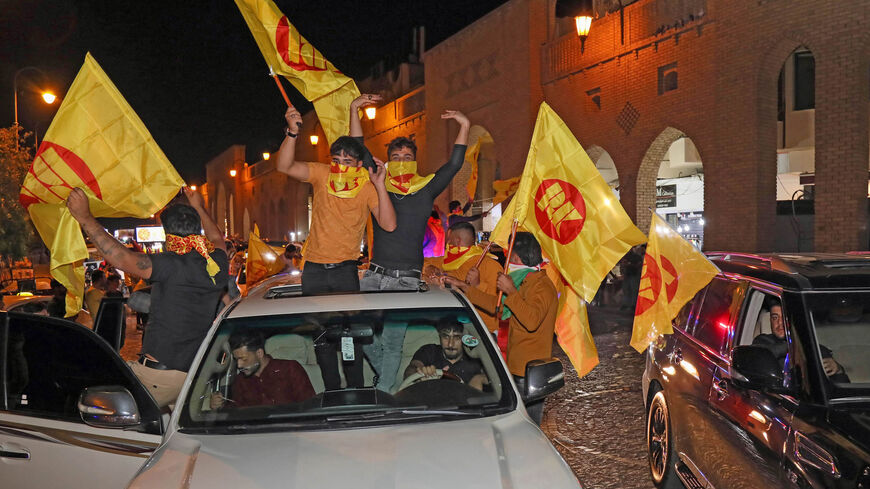Iraq’s two major Kurdish parties have been trying to reach a compromise between the two, but to no avail.

The UN secretary-general’s envoy to Iraq visited Aug. 10 the city of Erbil, capital of the Kurdistan Region, to attend a meeting of the leaders of the Kurdish political blocs, in the presence of President of Iraqi Kurdistan Nechirvan Barzani.
The visit was upon Barzani’s invitation and amid deepening divisions between the two major parties in the Kurdistan Region.
The attendees’ statement after the meeting read, “Nechirvan Barzani expressed his hope that the political parties would reach an understanding on setting a date for holding the elections and resolving the problems.”
According to the statement, the president said, “The delay in the elections harms the Kurdistan Region’s reputation and prestige.”
The differences between the two main parties — the Kurdistan Democratic Party (KDP) and the Patriotic Union of Kurdistan (PUK), which represent the two most prominent Kurdish families, the Barzani and Talabani families — are not something new.
Decades of conflict between the two sides culminated in an armed conflict in the 1990s. Today, the conflict is essentially a political struggle over influence in state institutions and representation in the Baghdad-based Iraqi central government.
Furthermore, Iraqi Kurdistan is witnessing frequent protests every once a while, most recently early this week in Erbil, Dahuk and Sulaimaniyah against both parties, mostly against the KDP that has more power share in the region, demanding for salaries that were delayed for months and other services and citizen rights.
After the Iraqi parliamentary elections in October 2021, however, the dispute between the two flared over the Kurdish presidential candidate, and has exacerbated further with the parliamentary elections in the Kurdistan Region fast approaching.
Over the past 10 months, a series of meetings and talks have taken place, but to no avail — until the most recent meeting that brought together Aug. 4 KDP leader Massoud Barzani and PUK leader Bafel Talabani, during which there was somewhat of a breakthrough.
Prominent KDP official Bankin Rekani told Al-Monitor, “The Kurdish parties are on the verge of putting an end to the differences and reaching positive results.”
He said, “The meeting that brought Barzani together with Bafel Talabani was the basis to ending the disputes. The two sides appear both ready to agree on the disputed files, and this will become clear soon.”
The two parties are vying for the post of the president of Iraq, which has been allocated to the Kurds in Iraq, as per tradition since 2003.
Iran’s Islamic Revolutionary Guard Corps, however, lent its support to the PUK candidate, Barham Salih, which deepened the crisis between the two parties, pushing each side to dig in their heels.
Disputes between the two parties are not limited to the federal government positions only; they also revolve around governance issues in the Kurdistan Region, how to deal with political developments and the opposition expansion, oil and gas investments and the division of resources between the major governorates of Erbil and Sulaimaniyah, with the latter being financially marginalized prompting protesters to demonstrate against the dire situation every now and then.
The PUK, which controls Sulaimaniyah, fears the KDP’s attempt to expand its influence over all areas.
According to Rizan Sheikh Diler, the PUK’s political adviser, does not agree with Rekani’s statements about an imminent agreement between the two sides, stressing that the recent meeting between the two leaders did not bring anything new to the table.
“The meetings are futile. Both sides are insisting on their decisions, and each has its own independent government. The only victims here are the governorates in Kurdistan that are affected by these ongoing differences,” she told Al-Monitor. “The crisis is likely to exacerbate in Kurdistan, especially with the upcoming legislative elections in the region slated for October.”
Up until 2018, the Kurds would run for the parliamentary elections under the same alliance called the “Kurdistan Alliance”; then they were on separate tickets.
In the 2021 parliamentary elections, the Kurds joined opposition lists; Barzani joined forces with the leader of the Sadrist movement, Muqtada al-Sadr, and Talabani joined the Shiite Coordination Framework, which is close to Iran.
“The recent meeting in Erbil Aug. 10 in the presence of the UN envoy did not have any positive outcome,” another Kurdish well-informed source told Al-Monitor on condition of anynomity.
Bilal Wahab, researcher at the Washington Institute, said in an article Aug. 1, “Washington has failed to use its remarkable influence with the two Kurdish parties, which includes providing direct annual aid of $240 million.”
The tense situation in Baghdad and the major parties’ failure to reach understandings with some calling to dissolve parliament and hold early elections undoubtedly affects the situation in Iraqi Kurdistan, especially since the two Kurdish parties have joined two opposing alliances in the capital.
